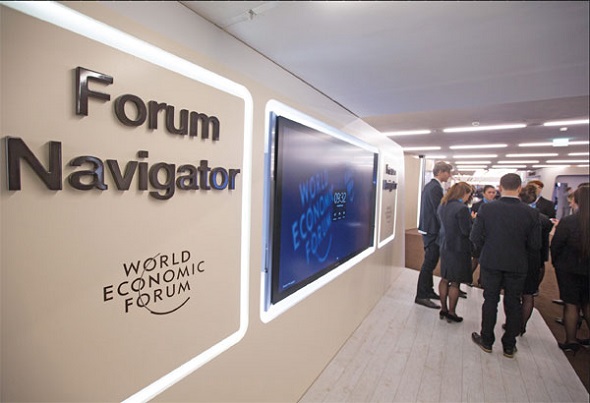
Some 60 heads of state and government are expected to attend the 2018 World Economic Forum in the Swiss resort of Davos from Jan 23-26. (Photo/Xinhua)
One year ago, when Donald Trump was sworn in as U.S. president, his European Union counterparts still believed he would take the Transatlantic Trade and Investment Partnership forward. But with Trump sticking to his "America First" isolationist policy, which he espoused during his presidential campaign, the EU decided to pursue globalization and deeper international engagement.
This is a typical example of a split in the developed world. It is also the backdrop against which more than 70 heads of state and government and up to 3,000 international business tycoons and opinion shapers will debate the future of the global economy at the World Economic Forum in Davos, Switzerland, from Tuesday to Friday.
The theme of this year's forum is "creating a shared future in a fractured world", with "shared" and "fractured" representing two contrasting key words, indicating the urgency to cope with the distressing reality of today's world.
In the small skiing town of Switzerland, the participants will discuss issues ranging from global governance, economy, new technologies and migration to movies and artificial intelligence. Perhaps to deepen the discussion on the forum's theme the participants need to view the issues from the point of global differences and divisions, and pay greater attention to countries that are contributing more to build a world of shared future.
In fact, the organizers of the Davos forum would be exaggerating facts if they allowed debates and discussions to begin with the assumption that the world is becoming increasingly fractured.
By freezing the TTIP talks, the United States and the EU have compromised their relationship as allies. At the same time, the U.S. has urged the EU to shoulder more responsibilities in safeguarding its borders. What's more, the U.S. has decided to abandon the hard-won 2015 Paris climate agreement and refuses to fulfill its global governance responsibilities.
Overall, the most advanced economies have not only distanced themselves at the bilateral level but also shown dissonance in their traditionally collective efforts to improve the global economy and governance.
Within the advanced West bloc, the fractures are clearly evident. For example, the EU is battling with the United Kingdom to finalize the terms of Brexit, while other extreme right-wing political forces try to tear the 28-member bloc apart. Populism, separatist forces and misplaced party politics are hell-bent on dividing the EU. And populism and conflicting bipartisan struggles are expanding in the U.S.
These new damaging developments are not only diminishing the solidarity of the developed world but also compromising the supply of global public goods, which the West must make concerted efforts to resolve. This will also help deal with the global challenges such as starvation, inequality, conflicts, wars and climate change.
It is encouraging, however, to see the developing world more actively responding to the global challenges. In January 2017, while addressing the Davos forum, President Xi Jinping raised the concept of a shared future for humankind. Putting its weight behind free trade and globalization, China has been offering more global public goods and engaging with a growing number of countries. The Asian Infrastructure Investment Bank has won the support of dozens of countries, with about half of the EU countries becoming members of the new multilateral financing platform. Also, about 100 countries have entered into agreements with China on Belt and Road Initiative cooperation, and the BRICS countries (Brazil, Russia, India, China and South Africa) have established cooperation mechanisms in various fields. There are many such encouraging cases.
So if the participants at the Davos forum want to achieve ideal outcomes, they have to pay attention to the fissures within the developed world, and how to fix them. But they should also know the world is not only about fissures. There are many new solution providers, such as China, and their role needs to be highlighted and supported.
The author Fu Jing is deputy chief of China Daily European Bureau.


















































